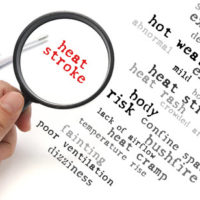Workers’ Compensation for Heat Exhaustion in Florida

The average summertime temperature in Florida is in the low 90s, with an annual average of between 70 and 80 degrees. As a result, heat exhaustion for laborers is a very real concern in the Sunshine State, and it is not uncommon for workers to fall ill to heat-related illnesses. In an effort to protect Florida workers, the Occupational Safety and Health Administration (OSHA) has recently brought back its heat illness prevention campaign and has made a valiant effort to ensure that employers provide enough shade, water, and rest to workers who are out in the heat on a regular basis. That said, not all employers have taken heed, and workers continue to suffer despite regulating authorities’ best efforts. If you work outside here in Florida, it is important that you understand your rights. Contact the lawyers at Barbas, Nuñez, Sanders, Butler & Hovsepian to discuss those rights today.
Types of Heat-Related Illnesses
Many workers, when they fall ill, do not think to connect their work conditions to their health. However, work makes up a majority of peoples’ lives, and it is not irrational to think that an illness or health condition IS work-related. In Florida, many cases of heat-exhaustion occur in those who make a living laboring in the sun. If you work in the sun on a regular basis, you may be susceptible to one or more of the three main types of heat-related illnesses:
- Heat Cramps: Heat cramps are extremely painful and occur after a long day of sweating and/or laboring in the heat. They are often accompanied by spasms.
- Heat Exhaustion: Heat exhaustion occurs when a person’s body suffers an extreme loss of water and salt due to excessive sweating. Symptoms of heat exhaustion include a body temperature of 100.4 degrees or higher, muscle cramps, headache, fatigue, diarrhea, nausea, and anxiety, amongst other symptoms.
- Heat Stroke: Heat stroke can be life-threatening if not treated in time. Heat stroke is characterized by a temperature of over 104 degrees, high fever, rapid heart rate, dry skin, nausea, vomiting, headache, agitation, lethargy, fatigue, seizure, and sometimes coma. If not treated in a timely fashion, it can cause death.
Your Rights and Employer Responsibility
Labor laws are in place to prevent the devastating consequences of heat-related illnesses. Employers have a duty to provide a safe and healthful work environment. While this looks different in every industry, employers whose workers labor in the sun are required to provide workers with adequate shade, rest, water, and other accommodations to prevent heat exhaustion. Employees who do suffer from heat-related illnesses have the right to file a workers’ compensation claim for their suffering and damages, and employers are not allowed to retaliate with any adverse action.
Take Measures to Protect Yourself
While your employer is responsible for providing you and your coworkers with safe and healthful work conditions, he or she can only do so much. You can take additional measures to keep yourself safe by doing the following:
- Wear cool, lightweight clothing;
- Drink plenty of fluids, including water and liquids with electrolytes;
- Wear hats and sunscreen;
- Acclimate yourself slowly to the heat; and
- If possible, avoid the sun between 10 am and 2 pm.
Contact a Florida Workers Compensation Attorney
Your employer is required by law to protect you from work-related illnesses. His or her failure to do so could result in an adverse action against him or her. If you suffered a heat-related illness because of your employer’s failure to provide you with a safe work environment, reach out to the Tampa workers’ compensation lawyers at Barbas, Nuñez, Sanders, Butler & Hovsepian to discuss your rights and legal options.
Resource:
osha.gov/SLTC/heatillness/dropin_article.html




